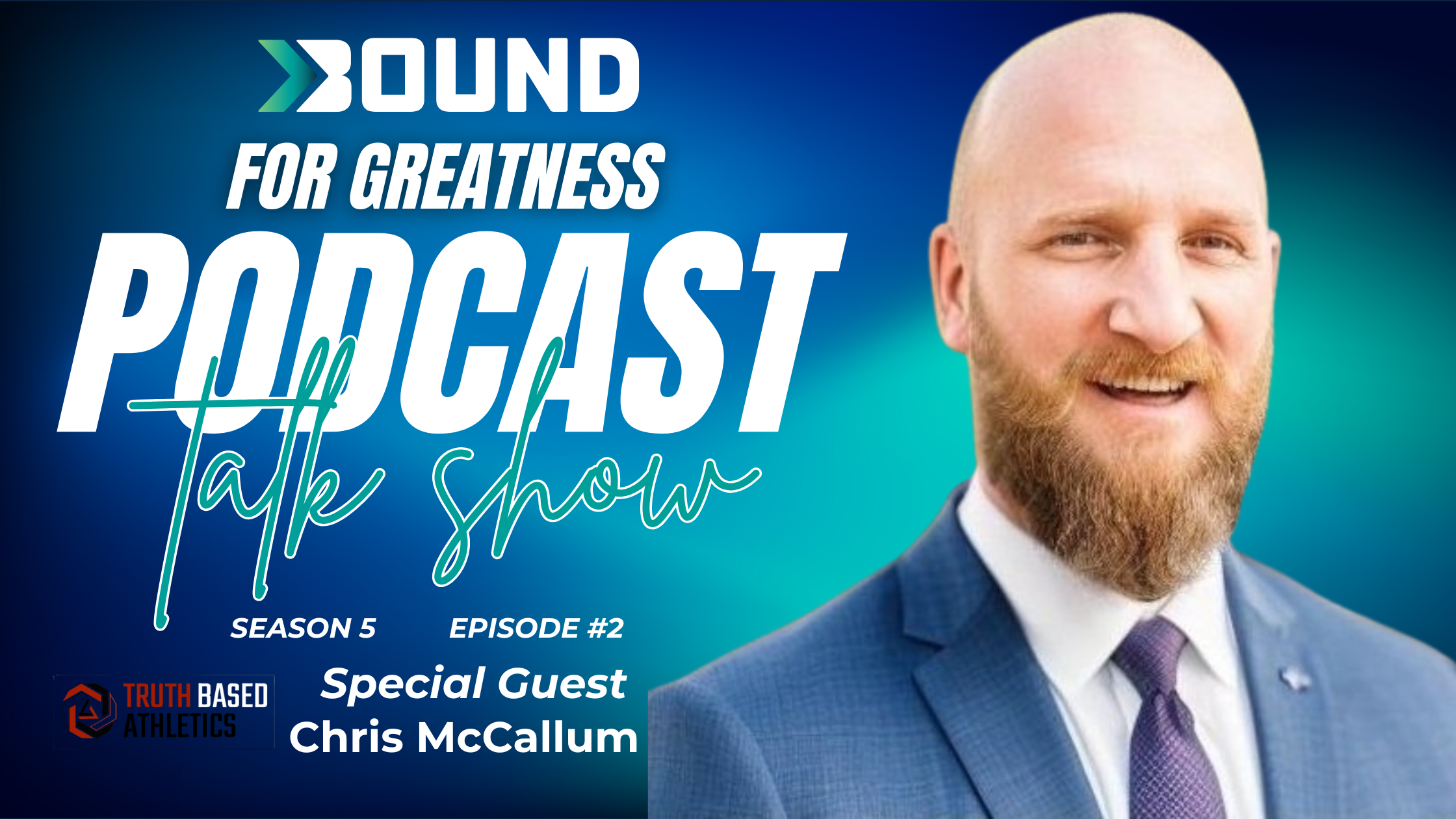On a Mission to Transform Athletics Through Intentional, Truth-Based Leadership

Beyond the Scoreboard: Chris McCallum's Mission to Transform Athletics Through Intentional, Truth-Based Leadership
By Scott Garvis C.M.A.A. Bound Chief Evangelist
In an era where sports leadership often grapples with reactive programming and burnout, Chris McCallum is rewriting the playbook. As the founder of Truth-Based Athletics, McCallum has committed his career to reshaping how schools, coaches, and athletic administrators view the power of sport. His goal? To make athletics truly curricular, with a focus on building intentional, research-based systems that prioritize growth, mentorship, and community impact.
McCallum, who has spent nearly two decades in international and independent schools across China, Germany, Brazil, and Canada, brings a global lens to local problems. Through his podcast conversation on Bound for Greatness with host Scott Garvis, McCallum unpacked the philosophy and frameworks behind Truth-Based Athletics.
From Global Experience to Local Impact
What started as a short-term teaching stint in Beijing turned into an 11-year journey that saw McCallum rise from coach to athletic director and lead commissioner. Subsequent stops in Germany and Brazil added to his global portfolio. These experiences weren’t just about logistics and competition; they were laboratories of leadership, failure, and evolution. “The plan was to stay for one to two years,” McCallum said. “It turned into 11, and it shaped everything I believe in today.”
Intentionality as a Foundation
At the heart of Truth-Based Athletics lies the concept of intentionality—a word McCallum uses with purpose. "I want to have one year of experience 30 or 40 times, not the same year over and over," he said. He defines intentionality as the mindset of continuous growth: identifying what truly matters, scheduling time accordingly, and evaluating whether your daily actions align with your program's greater mission.
He challenges leaders to distinguish between what's useful and what's effective. "It's easy to default to safe, visible actions. But real impact requires systems thinking, accountability, and the courage to fail forward."
The Framework: Define, Elevate, Sustain
Truth-Based Athletics operates on a three-part framework:
- Define and Align Common Purpose – Start by asking: What is your mission? What impact should your program leave in 20 years? Aligning stakeholders—students, coaches, parents, and administrators—under one purpose builds relational trust and accountability.
- Evaluate and Elevate Approaches – Are you teaching effectively? Are your programs just running, or are they developing minds and leaders? McCallum uses games-based approaches, memory psychology, and student-led decision-making to optimize learning.
- Assess and Revamp Systems – Sustainability comes through systems. Effective transportation scheduling, coaching development, and communication frameworks allow leaders to shift from reactive management to proactive culture building.
From Extra-Curricular to Co-Curricular
McCallum argues that most school sports programs fall into the trap of labeling themselves as "co-curricular" without meeting the standard. He proposes four pillars of a truly curricular program:
- Comprehensive – Offering multiple development pathways for students across different disciplines.
- Effective – Are you actually good at teaching the sport? Do your athletes grow technically, physically, and psychologically?
- Progressive – Programs should develop psychological skills like confidence, decision-making, and relatedness.
- Integrative – Athletics should not be siloed. Integration across school systems—academics, arts, student life—cements its educational value.
Breaking the Fear of Failure
"Fail early. Fail often. Fail forward. Fail together." It’s a mantra McCallum not only preaches but lives by. He sees failure not as an endpoint but as a threshold for transformation. “The earlier you make mistakes, the faster you can learn. And when you do it as a team, the culture becomes one of trust and adaptability.”
Empowering Leadership at Every Level
McCallum urges athletic leaders to view mentorship not as a checkbox but as a layered, scalable system. Athletic directors mentor coaches, coaches mentor athletes, and captains mentor their teams. He references the "Rule of Three" framework by UK-based leadership coach Mark Bennett: empower athletes to recognize and solve problems on the field before escalating them to coaches.
This empowerment extends to fan behavior, parental involvement, and student culture. “Telling someone to stop poor behavior is useful. Teaching them how to prevent it—and then empowering them to lead—is effective.”
A Call to Action for Athletic Directors
Too often, programs fall back on tradition. “This is how we’ve always done it” becomes a shield against change. McCallum challenges that mindset: “If your systems aren’t producing growth, they’re producing fatigue.”
The Truth-Based Athletics approach is not about trendy buzzwords. It's about building enduring, values-driven systems rooted in educational psychology, leadership research, and field-tested frameworks. For schools serious about building legacy-level programming, McCallum’s insights provide a powerful compass.
To learn more about Chris McCallum and Truth-Based Athletics, visit truthbasedathletics.com or listen to his full interview on the Bound for Greatness podcast.
